Strictly Personal
Russia, Ukraine: What is UN’s relevance? By Emmanuel Onwubiko
Published
3 years agoon

Exactly ten days after the world marked this year’s Saint Valentine’s Day, a day set aside for lovers to mark their solidarity and friendship, the world was thrown into a warfare that is beginning to be predicted as the commencement of World War III.
Russia under the dictatorial hold of their long term President Vladimir Putin declared war on Ukraine and commanded the armed forces of his nation to bombard Ukraine from land, sea and air in an effort to annex the country and stop it from enlisting into the North Atlantic Treaty Organization (NATO).
The opening verbal salvo from the aggressor in chief, was to warn the West to stay off Ukraine and let him achieve his plot to capture Ukraine. The Western democracies have responded with a rash of sanctions and subtle military aids to Ukraine but they can’t physically fight to stop Russia from having its way.
Incidentally, this ongoing invasion of Ukraine is the first real time war in this contemporary epoch that the rest of humanity are watching the military activities on televisions because of the sophistication of the means of broadcasting through cable television and satellite.
What this means is that the war in Ukraine began by Russia is seriously going to affect billions of people in the world just as those who are several thousands of kilometres away are also nursing the fear of this needless war because of the psychological trauma the violence that is being transmitted will unleash on everyone.
For a start, school kids who would also watch the proceedings of this war will even feel the emotional impacts much more than the elders. The President of the USA was the one who alerted that the long predicted military invasion has commenced. This was how some of us got wind of the war that began on February 24, 2022 when President Putin of Russia ordered his troops to bombard, invade and capture eastern Ukraine.
The President of the United States Mr. Joe Biden in a post on the social media wrote: “President Zelenskyy reached out to me tonight and we just finished speaking. I condemned this unprovoked and unjustified attack by Russian military forces. I briefed him on the steps we are taking to rally international condemnation, including tonight at the United Nations Security Council. He asked me to call on the leaders of the world to speak out clearly against President Putin’s flagrant aggression, and to stand with the people of Ukraine. Tomorrow, I will be meeting with the Leaders of the G7, and the United States and our Allies and partners will be imposing severe sanctions on Russia. We will continue to provide support and assistance to Ukraine and the Ukrainian people.”
Boris Johnson of the United Kingdom also said his nation and British people are praying for Ukraine. But the truth is that the combatants are right now killing each other inside Ukraine and the videos are actively transmitted to us.
From the publication Psychology Today by Stephanie A. Sarkis, she said watching violent news video can be hazardous to health. She wrote: “When I was an undergrad earning a degree in telecommunication production, I learned of a saying in TV news: “If it bleeds, it leads.” This means the more violent or anxiety-provoking event is, it draws in more viewers.
If you are watching videos of mass shootings or other violent events on TV or online, you are making yourself more prone to developing (or worsening) depression, anxiety, and post-traumatic stress disorder (PTSD).
When you watch a violent video of mass shootings and other violence, you increase your chances of developing vicarious traumatization. You are bombarding yourself with violent images while not being able to stop or help. This increases your chances of anxiety, depression, chronic stress, and insomnia. If you have PTSD, viewing these videos can cause an increase of symptoms such as flashbacks.
Repetitive viewing of violent news stories can increase fear and anxiety in viewers, and can even cause people to have increased health issues (Vasterman et al. 2005). In a study by Pfefferbaum, et al. (2014), viewing of disasters on television, particularly terrorism, can increase cases of PTSD, depression, anxiety, perceived stress, and even substance use.
In a study by Ahern et al. (2004), people who watched more television images in the seven days after 9/11 had more PTSD symptoms compared to people who had the least amount of viewing.
The traumatic effects of watching distressing images on the news can have a lasting effect. After the 2008 Sichuan Earthquake, adolescents who frequently watched earthquake imagery on the news had a higher rate of probable PTSD at a six-month follow-up (Yeung, et al. 2016)”, she concluded.
The Time Magazine has a comprehensive report of how key nations are responding to the Russian aggression against Ukraine. The magazine said countries across the globe have appealed to Russia to stop its invasion of Ukraine after Russian President Vladimir Putin announced a military operation to protect civilians in the breakaway Republics of Donetsk and Luhansk.
Ukraine’s Embassy in London called Putin’s order an “unprovoked war,” adding that Russia is waging “a war against Europe, a war against the whole world.”
Media reports say that explosions have been heard in the Ukrainian capital Kyiv, in Kharkiv and other areas of the country.
The Russian president warned against foreign intervention in the unfolding conflict. “To anyone who would consider interfering from the outside: if you do, you will face consequences greater than any you have faced in history. All relevant decisions have been taken. I hope you hear me,” Putin says.
The UN says: “The Russian president’s announcement came as the United Nations Security Council was holding an emergency meeting over the crisis in Ukraine. Ambassadors from countries including the U.S., the UK and Albania denounced the escalation of the conflict in the Donbas region in Eastern Ukraine.’’
UN Secretary-General Antonio Guterres attended the meeting, AP reported, and told Russia: “Stop your troops from attacking Ukraine. Give peace a chance.”
The Security Council is chaired by Russia. In a broadcast of the meeting, Sergiy Kyslytsya, Ukraine’s ambassador to the UN, could be heard demanding Russia relinquish its duties as council chair. “Call Putin. Call (Russian foreign minister Sergey) Lavrov to stop aggression.”
U.S. Ambassador Linda Thomas-Greenfield also lamented that Putin had “ordered that last step.”
“As we are gathered in the council seeking peace, Putin delivered a message of war in total disdain for the responsibility of the council,” she said. “The council will need to act and we will put a resolution on the table tomorrow.”
As the meeting ended, Ukraine’s Kyslytsya told the Russian envoy: “There is no purgatory for war criminals. They go straight to hell, ambassador.”
The USA, which has in the last few days provided blow- by- blow intelligence of the plots of Russia against Ukraine has already responded.
In a statement, U.S. President, Joe Biden, called the attack “unprovoked and unjustified,” saying that Russia has chosen a war “that will bring a catastrophic loss of life and human suffering.”
“Russia alone is responsible for the death and destruction this attack will bring, and the United States and its allies and partners will respond in a united and decisive way,” Biden said.
Biden also tweeted that he had spoken to Ukrainian President Volodymyr Zelenskyy. “He asked me to call on the leaders of the world to speak out clearly against President Putin’s flagrant aggression, and to stand with the people of Ukraine.”
The U.S. president added he would be monitoring the situation and will meet with his counterparts in other G7 countries and with U.S. allies in NATO to ensure “a strong united response.”
Ukraine has expressed the desire to join NATO, a move that Putin condemns. NATO can’t physically intervene because the application to enlist in it by Ukraine has yet to be approved and this was the immediate trigger.
This war is not just against Ukraine or Europe but against the relevance or otherwise of the United Nations system which is skewed to favour five Nuclear powers including the current aggressor in Ukraine which is Russia. To demonstrate how comical the UN system is, as Russia invaded Ukraine, Russian permanent Representative to the UN is the President of the UN General Assembly. The UN has condemned the invasion but the Security Council can’t take military action because Russia has veto power as well as China, which tacitly backs Putin in his aggression against Ukraine.
Whilst we have asked probing questions about the relevance of the UN when just one country with the might to launch Nuclear war can just decide to annex smaller nations and the UN can’t stop it. Why then are the nations united if just five members can decide to go rogue and the Heavens won’t fall? The bloodshed in Ukraine is needless and must stop forthwith.
Onwubiko is head of the Human Rights Writers Association Of Nigeria (HURIWA) and was federal commissioner of the National Human Rights Commission Of Nigeria.
You may like
-


Russian Foreign Ministry claims cargo ship sinks in Mediterranean following explosion
-
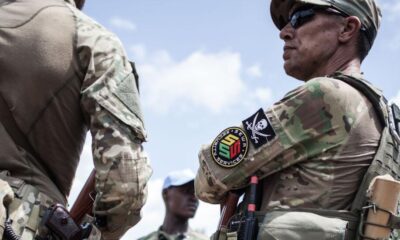

Mali rights group accuses Russian mercenaries of civilian atrocities
-
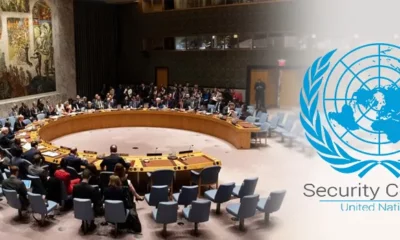

Russia vetoes Sudan conflict Security Council move
-
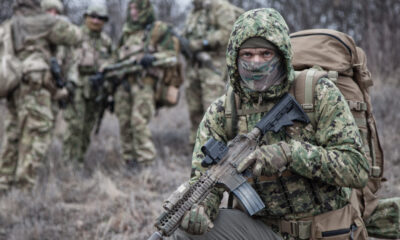

Military advisors from Russia arrive Equatorial Guinea
-


Russia claims African, ex-Soviet nations want its mpox vaccine
-
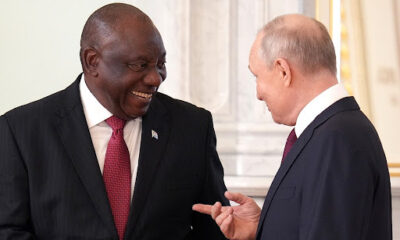

South Africa: Russia remains a valued ally, Ramaphosa tells Putin
Strictly Personal
Let’s merge EAC and Igad, By Nuur Mohamud Sheekh
Published
1 month agoon
November 27, 2024
In an era of political and economic uncertainty, global crises and diminishing donor contributions, Africa’s regional economic communities (RECs) must reimagine their approach to regional integration.
The East African Community (EAC) and the Intergovernmental Authority on Development (Igad), two critical RECs in East Africa and the Horn of Africa have an unprecedented opportunity to join forces, leveraging their respective strengths to drive sustainable peace and development and advance regional economic integration and promote the African Continental Free Trade Area (AfCFTA).
Already, four of the eight Igad member states are also members of the EAC and, with Ethiopia and Sudan showing interest, the new unified bloc would be formidable.
Igad’s strength lies in regional peacemaking, preventive diplomacy, security, and resilience, especially in a region plagued by protracted conflicts, climate challenges, and humanitarian crises. The EAC, on the other hand, has made remarkable strides in economic integration, exemplified by its Customs Union, Common Market, and ongoing efforts toward a monetary union. Combining these comparative advantages would create a formidable entity capable of addressing complex challenges holistically.
Imagine a REC that pairs Igad’s conflict resolution strengths with the EAC’s diplomatic standing and robust economic framework. Member states of both are also contributing troops to peacekeeping missions. Such a fusion would streamline efforts to create a peaceful and economically prosperous region, addressing the root causes of instability while simultaneously promoting trade investment and regional cooperation.
These strengths will be harnessed to deal with inter-state tensions that we are currently witnessing, including between Ethiopia and Somalia over the Somaliland MoU, strained relations between Djibouti and Eritrea, and the continually deteriorating relations between Eritrea and Ethiopia.
The global economy experienced as a result of the COVID-19 pandemic, compounded by the Ukraine war and competing global crises, has strained donor countries and reduced financial contributions to multilateral organisations and African RECs. Member states, many of which are grappling with fiscal constraints, are increasingly unable to fill this gap, failing to make timely contributions, which is in turn affecting key mandate areas of Igad and EAC, and staff morale.
A merger between Igad and EAC would alleviate this financial pressure by eliminating redundancies. Shared administrative systems, integrated programmes, and a unified leadership structure would optimise resources, enabling the new REC to achieve more with less. Staff rationalisation, while sensitive, is a necessary step to ensure that limited funds are channelled toward impactful initiatives rather than duplicative overheads.
The African Union (AU) envisions a fully integrated Africa, with RECs serving as the building blocks of the AfCFTA. A unified EAC-Igad entity would become a powerhouse for regional integration, unlocking economies of scale and harmonising policies across a wider geographical and economic landscape.
This merger would enhance the implementation of the AfCFTA by creating a larger, more cohesive market that attracts investment, fosters innovation, and increases competitiveness. By aligning trade policies, infrastructure projects, and regulatory frameworks, the new REC could serve as a model for others, accelerating continental integration.
The road to integration is not without obstacles. Political will, divergent institutional mandates, and the complexity of harmonising systems pose significant challenges. However, these hurdles are surmountable through inclusive dialogue, strong leadership, and a phased approach to integration.
Member states must prioritise the long-term benefits of unity over short-term political considerations. Civil society, the private sector, the youth, and international partners also have a critical role to play in advocating for and supporting this transformative initiative.
The time for EAC and Igad to join forces is now. By merging into a single REC, they would pool their strengths, optimise resources, and position themselves as a driving force for regional and continental integration. In doing so, they would not only secure a prosperous future for their citizens and member states but also advance the broader vision of an integrated and thriving Africa.
As the world grapples with crises, Africa must look inward, embracing the power of unity to achieve its potential. A combined Igad-EAC is the bold step forward that the continent needs.
Nuur Mohamud Sheekh, a diplomatic and geopolitical analyst based in London, is a former spokesperson of the Igad Executive Secretary. X: @NuursViews
Strictly Personal
Budgets, budgeting and budget financing, By Sheriffdeen A. Tella, Ph.D.
Published
1 month agoon
November 20, 2024
The budget season is here again. It is an institutional and desirable annual ritual. Revenue collection and spending at the federal, State and local government levels must be authorised and guided by law. That is what budget is all about. A document containing the estimates of projected revenues from identified sources and the proposed expenditure for different sectors in the appropriate level of government. The last two weeks have seen the delivery of budget drafts to various Houses of Assembly and the promise that the federal government would present its draft budget to the National Assembly.
Do people still look forward to the budget presentation and the contents therein? I am not sure. Citizens have realised that these days, governments often spend money without reference to the approved budget. A governor can just wake up and direct that a police station be built in a location. With no allocation in the budget, the station will be completed in three months. The President can direct from his bathroom that 72 trailers of maize be distributed to the 36 states as palliatives. No budget provision, and no discussion by relevant committee or group.
We still operate with the military mentality. We operated too long under the military and of the five Presidents we have in this democracy, two of them were retired military Heads of State. Between them, they spent 16 years of 25 years of democratic governance. Hopefully, we are done with them physically but not mentally. Most present governors grew up largely under military regimes with the command system. That is why some see themselves as emperor and act accordingly. Their direct staff and commissioners are “Yes” men and women. There is need for disorientation.
The importance of budget in the art of governance cannot be overemphasized. It is one of the major functions of the legislature because without the consideration and authorisation of spending of funds by this arm of government, the executive has no power to start spending money. There is what we refer to as a budget cycle or stages. The budget drafting stage within the purview of the executive arm is the first stage and, followed by the authorisation stage where the legislature discusses, evaluates and tinkers with the draft for approval before presenting it to the President for his signature.
Thereafter, the budget enters the execution phase or cycle where programmes and projects are executed by the executive arm with the legislature carrying out oversight functions. Finally, we enter the auditing phase when the federal and State Auditors verify and report on the execution of the budgets. The report would normally be submitted to the Legislature. Many Auditor Generals have fallen victim at this stage for daring to query the executives on some aspects of the execution in their reports.
A new budget should contain the objectives and achievements of the preceding budget in the introduction as the foundation for the budget. More appropriately, a current budget derives its strength from a medium-term framework which also derives its strength from a national Development Plan or a State Plan. An approved National Plan does not exist currently, although the Plan launched by the Muhammadu Buhari administration is in the cooler. President Tinubu, who is acclaimed to be the architect of the Lagos State long-term Plan seems curiously, disillusioned with a national Plan.
Some States like Oyo and Kaduna, have long-term Plans that serve as the source of their annual budgets. Economists and policymakers see development plans as instruments of salvation for developing countries. Mike Obadan, the former Director General of the moribund Nigeria Centre for Economic and Management Administration, opined that a Plan in a developing country serves as an instrument to eradicate poverty, achieve high rates of economic growth and promote economic and social development.
The Nigerian development plans were on course until the adoption of the World Bank/IMF-inspired Structural Adjustment Programme in 1986 when the country and others that adopted the programme were forced to abandon such plan for short-term stabilisation policies in the name of a rolling plan. We have been rolling in the mud since that time. One is not surprised that the Tinubu administration is not looking at the Buhari Development Plan since the government is World Bank/IMF compliant. It was in the news last week that our President is an American asset and by extension, Nigeria’s policies must be defined by America which controls the Bretton Woods institutions.
A national Plan allows the citizens to monitor quantitatively, the projects and programmes being executed or to be executed by the government through the budgeting procedure. It is part of the definitive measures of transparency and accountability which most Nigerian governments do not cherish. So, you cannot pin your government down to anything.
Budgets these days hardly contain budget performance in terms of revenue, expenditure and other achievements like several schools, hospitals, small-scale enterprises, etc, that the government got involved in successfully and partially. These are the foundation for a new budget like items brought forward in accounting documents. The new budget should state the new reforms or transformations that would be taking place. Reforms like shifting from dominance of recurrent expenditure to capital expenditure; moving from the provision of basic needs programmes to industrialisation, and from reliance on foreign loans to dependence on domestic fund mobilisation for executing the budget.
That brings us to the issue of budget deficit and borrowing. When an economy is in recession, expansionary fiscal policy is recommended. That is, the government will need to spend more than it receives to pump prime the economy. If this is taken, Nigeria has always had a deficit budget, implying that we are always in economic recession. The fact is that even when we had a surplus in our balance of payment that made it possible to pay off our debts, we still had a deficit budget. We are so used to borrowing at the national level that stopping it will look like the collapse of the Nigerian state. The States have also followed the trend. Ordinarily, since States are largely dependent on the federal government for funds, they should promote balanced budget.
The States are like a schoolboy who depends on his parents for school fees and feeding allowance but goes about borrowing from classmates. Definitely, it is the parents that will surely pay the debt. The debt forgiveness mentality plays a major role in the process. Having enjoyed debt forgiveness in the past, the federal government is always in the credit market and does not caution the State governments in participating in the market. Our Presidents don’t feel ashamed when they are begging for debt forgiveness in international forum where issues on global development are being discussed. Not less than twice I have watched the countenance of some Presidents, even from Africa, while they looked at our president with disdain when issues of debt forgiveness for African countries was raised.
In most cases, the government, both at the federal and state cannot show the product of loans, except those lent by institutions like the World Bank or African Development Bank for specific projects which are monitored by the lending institutions. In other cases, the loans are stolen and transferred abroad while we are paying the loans. In some other cases, the loans are diverted to projects other than what the proposal stated. There was a case of loans obtained based on establishing an international car park in the border of the State but diverted to finance the election of a politician in the State. The politician eventually lost the election but the citizens of the State have to be taxed to pay the loan. Somebody as “Nigeria we hail thee”.
Transformation in budgeting should commence subsequently at the State and federal level. Now that local government will enjoy some financial autonomy and therefore budgeting process, they should be legally barred from contracting foreign loans. They have no business participating in the market. They should promote balanced budget where proposed expenditures must equal the expected revenues from federal and internal sources. The State government that cannot mobilise, from records, up to 40 percent of its total budget from IGR should not be supported to contract foreign loans. The States should engage in a balanced budget. The federal government budget should shift away from huge allocations to recurrent expenditure towards capital expenditure for capital formation and within the context of a welfarist state.
Sheriffdeen A. Tella, Ph.D.
EDITOR’S PICK


‘Don’t start what you can’t finish’, ex-Nigerian official replies President Tchiani
Former Nigerian Aviation Minister, Femi Fani-Kayode, has told President Abdourahamane Tchiani of Niger Republic to refrain from making infantile and...


Again, Starlink raises prices of its services in Nigeria
Elon Musk’s satellite internet service provider, Starlink, has again jacked up the prices of its services in Nigeria after an...


Former President of Moroccan club Raja sentenced to 3 years in prison
The former President of Moroccan top club, Raja Casablanca, Mohamed Aouzal, has been sentenced to three and a half years...


Zambia announces second case of Mpox as country battles cholera outbreak
The Zambian Ministry of Health has reported a second case of Monkeypox, popularly known as Mpox, in Kitwe region of...


Obama names three African artistes in his Favorite Music list 2024
In keeping with the tradition of naming his favourite music list of the year, former United States President, Barack Obama,...
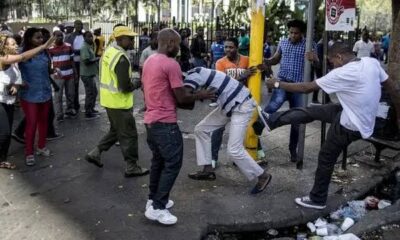

NCAS President confirms Nigerians killed extrajudicially in South Africa in 2024
The President of the Nigerian Citizens Association in South Africa (NCAS), Frank Onyewekelu, has confirmed that at least 20 Nigerians...


Niger citizen knocks President Tchiani for neglecting critical issues at home to peddle rumours against Nigeria
A citizen of Niger Republic has slammed the country’s military leader, President Abdourahmane Tchiani, for neglecting critical issues facing the...


Moroccan tourist arrivals hit record-breaking 16 million
The year 2024 has seen Morocco celebrate a record-breaking 16 million tourist arrivals, surpassing the 12 million mark set in...


Safaricom Ethiopia launches 4G network in Gambella
Ethiopia’s second largest telecom provider, Safaricom Telecommunications Ethiopia P.L.C., has announced the official launching of its 4G network services in...


Dumping England for Nigeria the best decision of my life— Ademola Lookman
Current African Men’s Footballer of the Year, Ademola Lookman, has attributed his rise in the football echelon to his decision...


